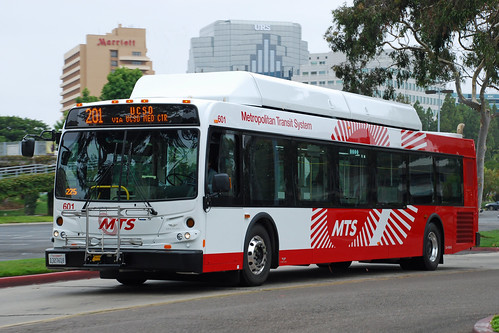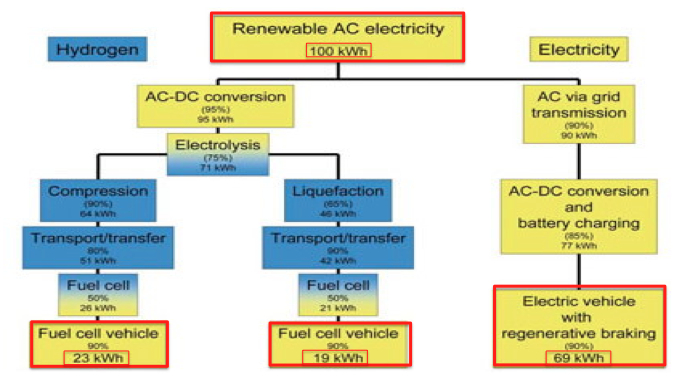Environment & Energy
Related: About this forumOhio: Hydrogen fuel cell buses joining Stark Area Regional Transit Authority
By John Funk, The Plain Dealer 9/27/16
CANTON -- The cleanest city buses in the state are about to begin rolling here. They will be powered by 150,000-watt fuel cells, and the only thing they will emit is water.
The Stark Area Regional Transit Authority, or SARTA, is about to roll out a fleet of 10 of these zero-emission vehicles. Fuel cells combine on-board hydrogen -- stored on the roof of the vehicle -- with oxygen from the air to generate electricity...snip

...The bus fleet -- which will be the third largest fuel cell fleet in the nation -- represent Ohio's manufacturing future, a future in which fuel cells will power automobiles as well as mass transit vehicles...snip
..."This is Ohio technology. This research is being done here in the public and private sectors that will lead to not only a cleaner transportation future but also to great jobs," he said...snip
Read More: http://www.cleveland.com/business/index.ssf/2016/09/hydrogen_fuel_cell_buses_joini.html
Hydrogen = Jobs

4lbs
(6,858 posts)

The San Diego Trolley is also ZEV.
Glad to see Ohio going green.
bananas
(27,509 posts)You don't have to wait at a bus stop, they pick you up and drop you off wherever you want.
http://www.10news.com/news/free-shuttle-rides-now-available-in-downtown-san-diego
http://www.sandiegouniontribune.com/business/sdut-downtown-shuttle-free-2016aug08-htmlstory.html
LWolf
(46,179 posts)why is it not being used in every city, and why is it not available to individual drivers?
I remember reading about this technology some years back here at DU and thinking then that we ought to be investing in moving it forward. It's good to know that it's happened, in a few places, in a smaller way. When can the rest of us get on board?
nationalize the fed
(2,169 posts)That's a good question.
Soon. This tech is taking off in a huge way in Japan and Germany - you might find some of these videos interesting, from the Hannover Fair 2016. They had a Fuel Cell / Hydrogen fair and the number of Hydrogen businesses was amazing.
https://www.youtube.com/user/H2FCHannover
This is the biggest thing to happen to energy in our lifetime. It's the birth of an industry that will be around for hundreds of years.
LWolf
(46,179 posts)We need to invest in infrastructure and start getting them out there.
kristopher
(29,798 posts)And even when it's made via electrolysis the major issue is that hydrogen storage and fuel cells are incredibly inefficient. That's significant because it require vastly more money and time to build the required renewable generating facilities. Unless there is a fundamental breakthrough in the fuel cell field, hydrogen is destined to remain a niche product to satisfy applications where cost is no object.
OKIsItJustMe
(19,938 posts)kristopher
(29,798 posts)When you are talking about increasing the energy costs of storage by 60% you are talking about something that is "incredibly inefficient". The primary drivers of hydrogen are those that 1) profit from creating infrastructural bottlenecks that allow extraction of higher profits and/or 2) those that want to continue promoting increases in energy consumption, like the fossil fuel and nuclear industries.
OKIsItJustMe
(19,938 posts)…
[font size=4]3.0 Well-to-Wheels Efficiency[/font]
[font size=3]Some analysts have concluded that fuel cell electric vehicles are less efficient than battery electric vehicles since the fuel cell system efficiency over a driving cycle might be only 52%, whereas the roundtrip efficiency of a battery might be 80%. However, this neglects the effects of extra vehicle weight on fuel economy. Since battery EVs are heavier than fuel cell EVs for any given range, the BEV will require more energy per mile driven.
In other words, we need to estimate the total “well-to-wheels” efficiency of the vehicle, not just the efficiency of any one component acting in isolation. For example, suppose we have one million btu’s of natural gas. What is more efficient: to convert that natural gas to electricity to drive a battery EV, or to convert that natural gas to hydrogen to run a fuel cell electric vehicle?
Figure 10 illustrates the answer: one would need to burn approximately 1.77 million btu’s (MBTU) of natural gas in a combustion turbine generate the electricity to power a battery EV for 300 miles on the EPA’s 1.25X accelerated combined driving cycle. For a more efficient combined cycle gas turbine generator system, 1.18 MBTU’s of natural gas would be required. But only 0.81 MBTU’s of natural gas would be required to generate enough hydrogen to power a fuel cell EV for 300 miles. On a full-cycle well-to-wheels basis, then, the hydrogen powered fuel cell electric vehicle is between 1.5 to 2.2 times more energy efficient than a battery EV in converting natural gas to vehicle fuel.
…
In effect, the increased weight of a long range battery EV, even assuming advanced Liion battery systems, almost eliminates the improved roundtrip efficiency of the battery pack compared to the fuel cell system. Note that the heavy battery EV (2,269 kg) requires almost as much energy (152.7 kWh) as the fuel cell EV (165.7 kWh) to travel 300 miles. This advantage diminishes at shorter range as the battery EV becomes lighter. As shown in Figure 11, the efficiency of a battery EV with only 100 miles range is almost identical to the total system efficiency of a fuel cell EV, assuming that the electricity is generated by a modern combined cycle turbine with 48% total system efficiency.
…
3/27/2009[/font][/font]
http://www.nrel.gov/docs/fy11osti/48437.pdf
[font size=3]Team: Darlene Steward, Genevieve Saur, Mike Penev, and Todd Ramsden: Hydrogen Technologies and Systems Center
Accomplishment: NREL researchers compared hydrogen to other energy storage technologies for a defined energy storage scenario (first reported in February 2010). The cost analysis showed that if cost reductions in hydrogen technologies were achieved, hydrogen could be competitive with batteries. Advanced hydrogen storage systems could also be a cost competitive alternative to pumped hydro and compressed air energy storage (CAES) under certain circumstances.
Context: As renewable electricity becomes a larger portion of electricity generation, new strategies will be required to accommodate fluctuations in generating energy. One primary strategy to integrate large amounts of renewable energy is using energy storage to absorb excess electricity- generating capacity during low demand and/or high rates of generation by renewable sources. After absorbing the excess electricity generation capacity, the stored energy can be reconverted into electricity during high demand and/or low renewable generation.
Energy Storage Cost Analysis: NREL developed a cost survey of the most promising and/or mature energy storage technologies while comparing them with configurations in which hydrogen was the energy carrier. NREL used a simple energy arbitrage scenario for a mid-sized energy storage system with a 300-MWh (megawatt-hour) nominal storage capacity charged during off-peak hours (18 hours per day on weekdays and all day on weekends) and discharged at 50 MW per six peak hours on weekdays.
NREL compared several storage configurations for hydrogen with battery, pumped hydro, and CAES technologies. Using HOMER, an optimization model for distributed power, NREL calculated for each storage technology the levelized cost (or total annualized cost) of the initial capital investment, interest, replacement costs, disposal and/or salvage value, and variable and fixed operating costs over the lifespan of the facility divided by the total yearly energy output from the system.
This analysis evaluated two scenarios for producing hydrogen in excess of that needed for the storage system. In one scenario, five 280-kg tanker-truck loads (or 1,400 kg/day) were produced for the vehicle market. In the second scenario, enough excess hydrogen was produced to feed 500 kg/h into a hydrogen pipeline.

…[/font][/font]
kristopher
(29,798 posts)Last edited Mon Oct 3, 2016, 04:35 AM - Edit history (1)
Every emissions reduction technology, including ordinary small engined gasoline and diesel vehicles, compares favorably to the DOE's official NREL emissions numbers for hydrogen when the comparison given is a reasonable one - a vehicle of the same 90~100kW power output as fuel cell vehicle and not a 200+kW 23mpg gas guzzler.
Much more at article.
http://cleantechnica.com/2014/06/04/hydrogen-fuel-cell-vehicles-about-not-clean/
And then there is this:
October 23, 2015 by Tony Seba
Hydrogen fuel cell vehicles (HFCVs) appear to be making a comeback. But according to author, lecturer and entrepreneur Tony Seba, HFCVs can’t compete with electric vehicles. “The hydrogen economy would be a massively wasteful economy that would at best use three to six times more energy than an electric vehicle and solar/wind infrastructure and many times more water than even gasoline uses.”
http://www.energypost.eu/toyota-vs-tesla-can-hydrogen-fuel-cell-vehicles-compete-electric-vehicles/

mackdaddy
(1,527 posts)There is a large public/private fuel cell research facility there in Canton, and they have a Fuel cell technical degree program. So having this bus program in the area makes sense. A bus like this has plenty of roof rack space for the high pressure hydrogen tanks too.
https://www.starkstate.edu/locations/fuel-cell-prototyping-center/
The big problem with this is still where does the pure Hydrogen come from to power the system. It is very energy intensive to manufacture pure hydrogen using any method, whether it is reforming from natural gas with steam, or splitting it from water molecules, in addition to the energy needed to compress and store it at the extreme pressures needed. (10,000 psi)
nationalize the fed
(2,169 posts)And that ~50 kWh number can and will be reduced
Just try to imagine how many kilograms of Hydrogen could have been made today with all the wasted sunlight and wind.
Japan and Germany are making this work, while the US is trying to overthrow the government of Syria.
mackdaddy
(1,527 posts)Not sure about the "wasted" solar/wind, but you always have to look at the entire systems efficiency.
Electrolysis takes about 50kwh to make 1kg of Hydrogen which has about 33kwh of energy or about the energy of a gallon of gasoline.
Fuel cells have about 50% electrical energy conversion or about 16kwh output per KG of hydrogen.
Chemical battery storage is currently much more efficient for energy storage on a kwh in vs kwh out, but has disadvantages of time to recharge, and total storage capacity. Hydrogen has a big advantage when much larger amounts of energy needs stored on board the vehicle for weight such as submarines, and maybe buses.
A big issue also with hydrogen is the extremely high pressures it needs for storage. It takes quite a bit of energy to run the extremely high pressure compressors, and very special tanks to store the hydrogen at 10,000 psi.
http://www.mpoweruk.com/hydrogen_fuel.htm
Actually Anhydrous Ammonia is a much better hydrogen carrier. Easier and cheaper to make, store, and can be used in IC engines or fuel cells too.
http://www.agmrc.org/renewable-energy/renewable-energy/ammonia-as-a-transportation-fuel/
kristopher
(29,798 posts)Figured you'd want an accurate headline.